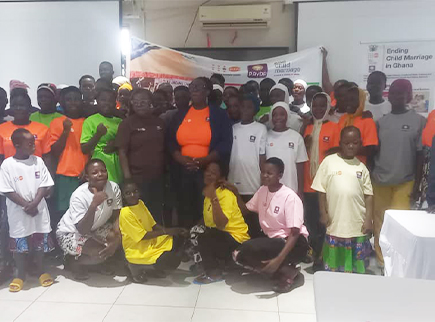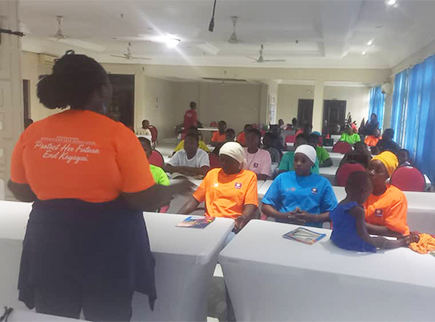The Purim for African Youth Development Platform (PURIM), a non-governmental organisation, has empowered vulnerable adolescent girls with knowledge, skills, and leadership tools to champion efforts against child marriage and sexual and gender-based violence (SGBV).
Apart from being empowered to educate their peers with accurate information on Sexual and Reproductive Health and Rights (SRHR), the girls have also been empowered to refer cases of child marriage and SGBV to the appropriate authorities such as community leaders, including chiefs, assembly members, and the police, for appropriate action.
Under the Promoting Adolescent Safe Spaces (PASS) initiative, the move is part of a global programme supported by the United Nations Population Fund (UNFPA) aimed at ending child marriage.
The PASS initiative not only offers educational and psychosocial support, but also provides livelihood and digital skills training to enable the girls to become economically empowered.
The beneficiary girls, aged 10 to 19 years, selected from Bongo in the Upper East Region and Walewale in the North East Region, were trained on SRHR, SGBV, the Constitution of Ghana, the Convention on the Rights of the Child, sexually transmitted infections, and child labour.
Speaking at a two-day training workshop held in Bolgatanga for the young girls, Reverend Aku Xornam Kevi, the Executive Director of PURIM, said the programme focused on reaching out to vulnerable girls, including teenage mothers, head porters (kayayei), and girls from deprived and rural areas.

She said certain cultural and gender norms in the communities made the girls to feel disempowered and scared to report abuses and child marriage, and underscored the urgent need to address that challenge.
“We believe that real empowerment starts with a mindset shift. If the mind of the girl changes, she becomes empowered. That is why we are not just giving out livelihood training but also investing in leadership, gender awareness, legal literacy, and reproductive health education,” she said.
As part of the project, Reverend Kevi said about 2,000 girls were expected to be trained this year in various vocational and entrepreneurial skills, taking into consideration the interest of the beneficiaries.
“Last year, we did about 7,000 girls and we believe that it is empowerment and will go a long way to change the mindset of these girls”, she said.
Touching on the successes of PAYDP, which was formed in 2007, and the PASS initiative, which started 2017, Reverend Kevi revealed that about 20 initially out-of-school girls had returned to the formal education system, while others had become artisans, farmers, entrepreneurs, and even entered male-dominated fields like plumbing and electrical work.
“When these girls realise that they are not just brides, but they can be doctors, lawyers, ministers, or even Imams, they begin to take charge of their future,” she said.
She added that the target was to reach about 1,000 girls by the end of the year through peer education that the trained girls would replicate in their communities.
Ms Mavis Adongo, one of the beneficiaries of the training from Bongo, lauded PAYDP and the UNFPA for the empowerment, stating that it had strengthened her resilience against abuse and that she would replicate the knowledge acquired to her peers in her community.
Ms Nafisah Iddrisu, another beneficiary from Walewale, noted that she had learnt how teenage pregnancy and STIs could truncate the educational future of girls, adding that she would champion efforts to empower girls in her community to stand against such abuses.

